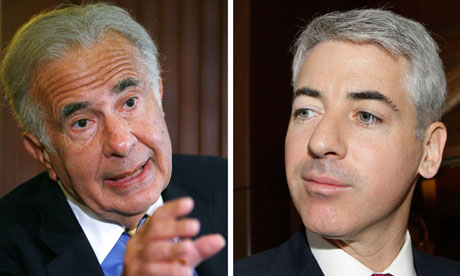What happens when two hedge fund managers decide to stop being polite and start getting real? You get one of the most amazing billionaire brawls ever televised.
Carl Icahn and Bill Ackman are powerful hedge fund managers who control billions of dollars as well as fearsome public images. Yet on Friday afternoon, on CNBC's Halftime Report, they were calling each other names like high-school girls screaming and pulling each other's hair over a boy.
"I appreciate you calling me a great investor," Icahn huffed to Ackman, as trading floors all over New York watched, aghast. "Unfortunately I can't say the same for you."
CNBC clearly knew it was onto ratings gold: not only could viewers hear traders gasping in the background, but CNBC quickly slapped a label on it: "Billionaire Showdown".
That's nothing to Icahn's previous epithets against Ackman, which include "shakedown artist". Today, he added to the oeuvre, calling Ackman the "little crybaby in the schoolyard". He added a few more snipes for good measure: "I couldn't figure out if he was the most acrimonious guy I met in my life or just arrogant"; "He's the quintessential example of if you want a friend on Wall Street, get a dog".
Ackman, just slightly more diplomatic, said Icahn "was not used to having people stand up to him".
It's the young buck against the lion in winter, and it's been brewing for years. Ackman and Icahn fell out in 2005, when a deal they struck together went bad. Ackman suggested this week that tiff was the source of the current war between them. In a press release, Ackman wrote of the 2005 fight:
After Carl paid my investors, he called me up, congratulated me on winning, and said that he wanted to be my friend. I told him that I had no interest in being his friend. Carl Icahn is a great investor, but, in my experience, he does not keep his word.
To understand why this means anything at all to Wall Street, you have to understand the vaunted place that Ackman and Icahn occupy in the imaginations of professional investors.
Ackman and Icahn are actually very much alike, two sides of the same coin. It's not hard to picture the young Ackman becoming something like the gruff, impatient Icahn. Both are charismatic, as immaculately dressed as diplomats but always ready to pick a fight... for the right reason. Their fury is usually strategic, meant to scare off an enemy or bring a CEO to heel; while both always like to surprise with their frankness, they are rarely given to emotional displays like the brawl on CNBC.
Ackman and Icahn usually turn their vitriol on under-performing CEOs; as activist investors they should, presumably, be part of the same brotherhood that includes other pugilistic money managers like Daniel Loeb. An activist investor is one who buys the stock of under-performing companies and spends months wheedling, cajoling and bullying the management into doing whatever it takes to raise the stock price. To be an activist investor you have to be aggressive, bullheaded and completely convinced that you're right. This often does not translate to "plays well with others".
In addition, Ackman and Icahn are publicity hounds when it comes to their latest investments – and because their jobs depend on their credibility, they jealously guard their public images. Reporters, generally, love them, because they tackle big companies and always give great quotes.
But there are some differences, too.
Ackman, in his mid-40s, is something of an investing wunderkind, a prodigy from the wealthy New York suburbs who started his first investing firm right after graduating from the Harvard Business School. His face is youthful but his hair is prematurely white, which gives him the looks of a cherub. His attacks tend to be primarily intellectually driven – he prides himself on staying rational and unemotional – and one gets the sense that being right is very, very important to him. (His father, Lawrence Ackman, is a well-respected real-estate investor) At Ackman's famous investing presentations, in which he invites other money managers to learn why he has turned against a certain company, the investors look at him, wide-eyed and admiring, as if he were a financial messiah.
Icahn, who is in his mid-70s, is a native of Queens and a Princeton graduate. He is a core piece of the legend of the hostile takeover craze that ruled Wall Street in the 1980s (think Gordon Gekko). Icahn has taken on TWA, US Steel and Yahoo!; Ackman has tackled Wendy's, Target and Borders.
The current argument between Ackman and Icahn was allegedly spurred by a single stock: Herbalife, the nutrition-and-weight-loss company. Ackman is betting against the company. It's not known if Icahn owns any Herbalife stock, but he's certainly happy to debate the value of the stock, bitterly, with Ackman.
But don't be fooled; the battle between Ackman and Icahn is not about a single stock, or a single legal tiff that's seven years old. It is a generational battle for dominance in the world of activist investing. Ackman's rise in the past seven years has been rapid, and he is among the richest of his generation of investors and certainly among the most charismatic; Icahn is nowhere near ready to give up his role as the gray eminence of the activist investing world. It's an intriguing look into how the real Wall Street works – on egos and personality clashes and personal interest more than money.
Luckily for anyone who is curious about Wall Street, this looks like a long-running show that would put the Kardashians to shame. Grab your popcorn.

No comments:
Post a Comment